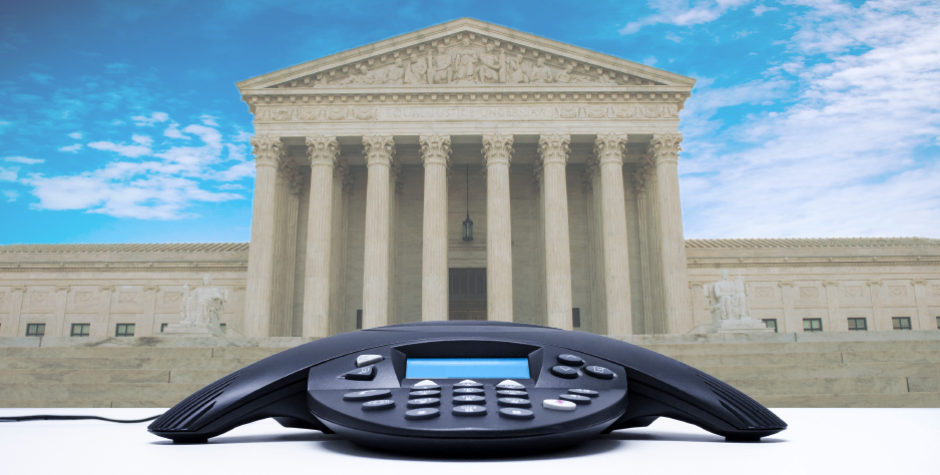In a Historic Move, the Supreme Court Announces It Will Hear Postponed Cases in which ACLJ Filed Amicus Briefs Via Teleconference in May
The Coronavirus pandemic has put much of the entire world in limbo. Many businesses have had to shutter, at least temporarily, as have non-essential governmental agencies, and even in some respects the judicial system.
In fact, some of the cases we’ve been engaged in have been temporarily postponed by the courts in the interest of social-distancing and preventing the spread of COVID-19.
Thankfully technology has enabled some important institutions to regroup and carry on, even during the pandemic.
For the first time in history, the U.S. Supreme Court has now announced that it will be hearing cases that were set for hearing prior to the breakout of the pandemic via telephone conference in early May.
Counsel will be on their phones, and the individual Justices will be operating remotely from within their own chambers. You will be able to hear the audio of the arguments in real time as the media will have instant access to the proceedings. This is truly unprecedented.
Among the cases on the docket for those days are three cases that the ACLJ has been actively engaged in.
In one of our longest running fights, we’ve been battling ObamaCare’s abortion-pill mandate and its assault on religious freedom for years. We’ve told you how we’ve taken on the costly, lengthy, and unconstitutional efforts of the Obama Administration that forced family-owned businesses and non-profit advocacy groups to set aside their religious beliefs or surrender their right of conscience. We filed an amicus brief with the United States Supreme Court in support of the Little Sisters of the Poor and other groups challenging the abortion-pill mandate which requires even religious charities to facilitate the provision of morally objectionable drugs and services, including abortion pills.
The oral argument was originally scheduled for April 29, 2020, but had been postponed due to the Coronavirus outbreak. Now, the Court will hear this case – via telephone – in early May. It is critical that the Supreme Court resolve cases like this that have a tremendous impact on life and religious liberty.
We told you the ACLJ filed a critical amicus brief in Agency for International Development v. Alliance for Open Society International, Inc. supporting a common-sense policy requirement attached to the President's Emergency Plan For AIDS Relief (PEPFAR) initiative. The program is credited with saving millions of lives, but grantees objected to the requirement that to be eligible, applicants must expressly oppose sex trafficking and prostitution. These opponents claim the requirement violates their First Amendment rights. It doesn’t.
We filed our amicus brief defending the policy requirement as a permissible eligibility criterion closely related to the purpose of the grant project, arguing:
The statutory requirement that grantees have an express policy against sex trafficking and prostitution is “nothing more than a means of selecting suitable agents to implement the Government’s chosen strategy” . . . as such, the requirement does not violate the First Amendment as to foreign or domestic entities. This Court should reverse the judgment of the Second Circuit.
Now the Supreme Court will hear telephone oral arguments in the coming weeks.
In the consolidated cases of Our Lady of Guadalupe School v. Morrisey-Berru and St. James School v. Biel we filed an amicus brief with the Supreme Court, urging the Court to reverse two decisions from the Ninth Circuit Court of Appeals that severely diminished the religious liberty of churches and religious schools. Faith-based organizations should have the protected right to hire employees with like-minded beliefs.
The two cases, Our Lady of Guadalupe School v. Agnes Morrissey-Beru, and St James School v. Biel, involve the important religious liberty principle called “the ministerial exception.” Broader than its name implies, the ministerial exception protects churches and other religious organizations from government interference in decisions about who leads worship or teaches religion. Federal and state governments cannot force churches and religious institutions to abandon their beliefs in regard to their employees.
In filing this amicus brief, we are continuing the fight to protect the freedom of religious organizations to select leaders and employees free from government interference.
We are living in unfamiliar times that create unique problems. They demand unusual solutions like this. As we’ve said many times in recent weeks, the work of the ACLJ does not stop, even during a global health crisis.
We will continue to fight at the Supreme Court in defense of religious liberty and the United States Constitution.
